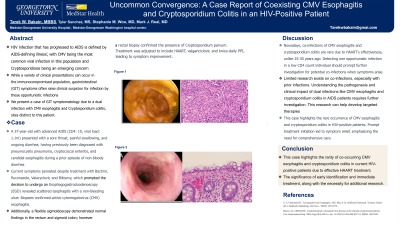Sunday Poster Session
Category: Esophagus
P0478 - Uncommon Convergence: A Case Report of Coexisting CMV Esophagitis and Cryptosporidium Colitis in an HIV-Positive Patient
Sunday, October 22, 2023
3:30 PM - 7:00 PM PT
Location: Exhibit Hall


Tarek W. Bakain, MBBS
MedStar Georgetown-Washington Hospital Center
Washington, DC
Presenting Author(s)
Tarek W. Bakain, MBBS1, Tyler Sanchez, MD2, Stephanie M. Woo, MD3, Mark J. Real, MD3
1MedStar Georgetown-Washington Hospital Center, Washington, DC; 2Georgetown University, Washington, DC; 3MedStar Georgetown University Hospital, Washington, DC
Introduction: Gastrointestinal symptoms in immunocompromised patients raise concerns about atypical pathogen manifestations. This case presents a rare occurrence in an HIV-positive patient with simultaneous CMV esophagitis and Cryptosporidium colitis.
Case Description/Methods: A 37-year-old patient with uncontrolled AIDS, a CD4 count of 10, and a viral load of 1.1m presented with a sore throat, odynophagia, and ongoing diarrhea. He had a previous episode of non-bloody diarrhea accompanied by constitutional symptoms, diagnosed with pneumocystis pneumonia, cryptococcal enteritis, and candidal esophagitis. Current symptoms persisted despite treatment with Bactrim, fluconazole, Valacyclovir, and Biktarvy, prompted the decision to undergo an Esophagogastroduodenoscopy (EGD), which revealed scattered esophagitis with a non-bleeding ulcer. Biopsies confirmed active cytomegalovirus (CMV) esophagitis. Additionally, a flexible sigmoidoscopy demonstrated normal findings in the rectum and sigmoid colon; however, a rectal biopsy confirmed the presence of Cryptosporidium parvum. Treatment was adjusted to include HAART, valganciclovir, and twice-daily PPI, leading to symptom improvement.
Discussion: Nowadays, co-infections involving CMV esophagitis and cryptosporidium colitis are rare due to the effectiveness of HAART, in contrast to the 25-30 years ago when such co-infections were common. Detecting a single opportunistic infection in an individual with low CD4 count should prompt clinicians to investigate potential co-infections if symptoms arise. Limited literature exists on these co-infections; although a possible link between CMV and Cryptosporidium has been suggested, no literature has reported the specific site involvement observed in this patient.
Further research is necessary to understand the pathogenesis and clinical implications of dual infections like CMV esophagitis and cryptosporidium colitis in AIDS patients. Exploring the interactions between these pathogens and their impact on the immune system can inform targeted therapeutic approaches.
This case highlights the rarity of simultaneous CMV esophagitis and cryptosporidium colitis, which is uncommon today in HIV-positive patients. Timely initiation of appropriate therapy led to symptom resolution, emphasizing the importance of comprehensive treatment strategies.

Disclosures:
Tarek W. Bakain, MBBS1, Tyler Sanchez, MD2, Stephanie M. Woo, MD3, Mark J. Real, MD3. P0478 - Uncommon Convergence: A Case Report of Coexisting CMV Esophagitis and Cryptosporidium Colitis in an HIV-Positive Patient, ACG 2023 Annual Scientific Meeting Abstracts. Vancouver, BC, Canada: American College of Gastroenterology.
1MedStar Georgetown-Washington Hospital Center, Washington, DC; 2Georgetown University, Washington, DC; 3MedStar Georgetown University Hospital, Washington, DC
Introduction: Gastrointestinal symptoms in immunocompromised patients raise concerns about atypical pathogen manifestations. This case presents a rare occurrence in an HIV-positive patient with simultaneous CMV esophagitis and Cryptosporidium colitis.
Case Description/Methods: A 37-year-old patient with uncontrolled AIDS, a CD4 count of 10, and a viral load of 1.1m presented with a sore throat, odynophagia, and ongoing diarrhea. He had a previous episode of non-bloody diarrhea accompanied by constitutional symptoms, diagnosed with pneumocystis pneumonia, cryptococcal enteritis, and candidal esophagitis. Current symptoms persisted despite treatment with Bactrim, fluconazole, Valacyclovir, and Biktarvy, prompted the decision to undergo an Esophagogastroduodenoscopy (EGD), which revealed scattered esophagitis with a non-bleeding ulcer. Biopsies confirmed active cytomegalovirus (CMV) esophagitis. Additionally, a flexible sigmoidoscopy demonstrated normal findings in the rectum and sigmoid colon; however, a rectal biopsy confirmed the presence of Cryptosporidium parvum. Treatment was adjusted to include HAART, valganciclovir, and twice-daily PPI, leading to symptom improvement.
Discussion: Nowadays, co-infections involving CMV esophagitis and cryptosporidium colitis are rare due to the effectiveness of HAART, in contrast to the 25-30 years ago when such co-infections were common. Detecting a single opportunistic infection in an individual with low CD4 count should prompt clinicians to investigate potential co-infections if symptoms arise. Limited literature exists on these co-infections; although a possible link between CMV and Cryptosporidium has been suggested, no literature has reported the specific site involvement observed in this patient.
Further research is necessary to understand the pathogenesis and clinical implications of dual infections like CMV esophagitis and cryptosporidium colitis in AIDS patients. Exploring the interactions between these pathogens and their impact on the immune system can inform targeted therapeutic approaches.
This case highlights the rarity of simultaneous CMV esophagitis and cryptosporidium colitis, which is uncommon today in HIV-positive patients. Timely initiation of appropriate therapy led to symptom resolution, emphasizing the importance of comprehensive treatment strategies.

Figure: Image 'A' : Diffuse scattered esophagitis with non-bleeding ulceration noted from 22cm from the incisors to the GE junction. Biopsies are taken at the edge and center of ulceration at various levels to assess for CMV (Cytomegalovirus) and EBV (Epstein Barr Virus).
Image 'B': The esophageal biopsies revealed active esophagitis with an ulcer and granulation tissue containing intracytoplasmic viral inclusions, which were morphologically consistent with cytomegalovirus inclusions with positive CMV immunostaining.
Image 'C': Normal rectum and sigmoid colon. Biopsies were taken to rule out CMV. Retroflexed views revealed no abnormalities.
Image 'D': Rectal biopsies revealed colorectal mucosa with erosion and GMS-positive organisms within the crypt consistent with cryptosporidium parvum with PAS-D/ Mucicarmine and PAS-LG being positive for yeast forms and negative for CMV immunostaining.
Image 'B': The esophageal biopsies revealed active esophagitis with an ulcer and granulation tissue containing intracytoplasmic viral inclusions, which were morphologically consistent with cytomegalovirus inclusions with positive CMV immunostaining.
Image 'C': Normal rectum and sigmoid colon. Biopsies were taken to rule out CMV. Retroflexed views revealed no abnormalities.
Image 'D': Rectal biopsies revealed colorectal mucosa with erosion and GMS-positive organisms within the crypt consistent with cryptosporidium parvum with PAS-D/ Mucicarmine and PAS-LG being positive for yeast forms and negative for CMV immunostaining.
Disclosures:
Tarek Bakain indicated no relevant financial relationships.
Tyler Sanchez indicated no relevant financial relationships.
Stephanie Woo indicated no relevant financial relationships.
Mark Real indicated no relevant financial relationships.
Tarek W. Bakain, MBBS1, Tyler Sanchez, MD2, Stephanie M. Woo, MD3, Mark J. Real, MD3. P0478 - Uncommon Convergence: A Case Report of Coexisting CMV Esophagitis and Cryptosporidium Colitis in an HIV-Positive Patient, ACG 2023 Annual Scientific Meeting Abstracts. Vancouver, BC, Canada: American College of Gastroenterology.
